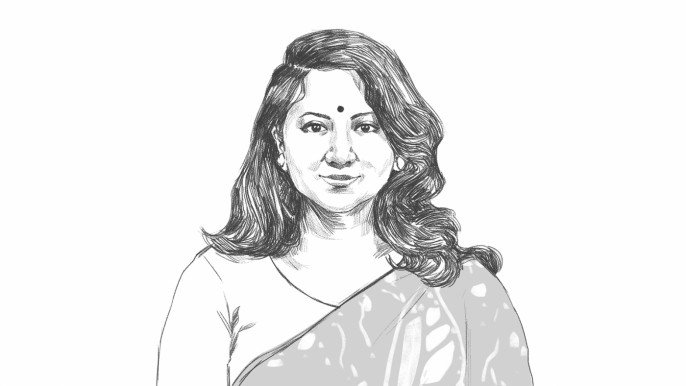
Vaccine justice: Some disquieting facts from the field
November 17th 2021

Sketch of Nahida Akhter
While images of uncontrollable crowds at the vaccine centres during the recent mass inoculation seem to indicate that Bangladesh has addressed the challenge of large scale vaccine hesitancy, a key question remains: are we ensuring vaccine justice to all, especially at the margins.
Until now, most global and local studies have focused on vaccine hesitancy and acceptance as critical challenges to tackle in the drive to rein in the rampant Covid-19 virus. However, the vaccination landscape has changed dramatically in the recent past, buoyed by a healthy rise in willingness to get vaccinated.
Having won the battle over minds on vaccine acceptance, the moot challenge now is of providing vaccines to 117.8 million target populations. It is timely to recollect the prescient words of Tedros Adhanom Ghebreyesus, Director-General of the World Health Organisation (WHO) - "Vaccine equity is the challenge of our time."
Though the Government of Bangladesh's drive for mass inoculation has got off to a good start with spot registrations and 39.2 million online registrations (as on 6th September, 2021), delivering vaccines on the ground to meet this urgent demand is proving to be a daunting task.
Vaccines and the digital divide
Online registration is currently a prerequisite for getting the vaccine and this has provoked concerns of digital exclusion as Internet Connectivity is quite low for the country as a whole.
According to the latest National ICT Household Survey 2019, access to internet and technological devices is very limited for the rural community (34.8%) and for the elderly population aged more than 60 (2.7%).
Women also lag far behind (34.2%) their male counterparts (53.2%) in internet usage. Given this reality, an online registration process runs a heavy risk of excluding the people living as digital immigrants (newly adapting), or digital naives (completely incapable of using the Internet) from the vaccination process.
Profiling vaccine vulnerability is also severely hampered by gaps in information. There is no reliable data that provides a micro picture of the vaccine-recipients based on their socio-economic status. In other words, we do not know who is falling off the vaccine grid.

Vaccine equity is the challenge of our time.
We need to know which are the "hard-to-reach" groups (marked by high levels of demand, but face supply shortages), and the "hard-to-vaccinate" groups (characterised by low levels of demand despite having no supply constraints).
Evidence from the field
In an effort to explore marginalised communities' experience of Covid-19 and their perceptions and attitudes toward the vaccine, the Centre for Peace and Justice (CPJ) at Brac University is tracking a national sample of 1,533 marginalised households through a field survey and has hosted selected focus group discussions under the study, "Voices from the Margins and Inclusive Policy Responses in Covid-19 Pandemic".
Initial evidence reveals a picture of hesitant communities grappling with uncertainty and confusion as they are left with very little information. Misinformation, superstition and cynicism abound. One of the focus group participants who has a person with disabilities in the household expressed his concerns saying, "Poor people do not need the vaccine. Allah will save us. Also, I have heard that the vaccine causes fever and sickness. How will I go to work if I get sick? Who will feed my family?"
Online registration is currently a prerequisite for getting the vaccine and this has provoked concerns of digital exclusion as Internet connectivity is quite low for the country as a whole.
Evidence from our survey suggests that 52.4% of the respondents interviewed from marginalised households living in remote rural areas, urban slums, ethnic and religious communities, people with disability and female heads, reported that not one eligible member in their household has been vaccinated (as of June 15, 2021). Additionally, one in 10 of the respondents had no idea about the registration process and one in two did not even know the whereabouts of the vaccine centres.
Vaccine hesitancy still persists. When asked if they think that the vaccine is necessary for resisting Corona, 60% said yes whereas 13% said no and 27% were unsure.
When inquired about the attitude towards the vaccine one in 10 thinks it has severe side effects, with an equal proportion considering the vaccine unsafe. One in five respondents said poor people do not need the vaccine and 6% think that the vaccine would not work against Corona.
Overall, our survey found almost half of the respondents (46%) still being hesitant or critical about the vaccine. And as most of their worries about the side effects have not yet been allayed, 28% are still very much or moderately concerned about getting vaccinated.
Inclusion is key
It is critical that all sections of society get an equal opportunity to get the vaccine. As the President of the UN General Assembly, Volkan Bozkir has recently warned : "No one is safe until all are safe, and vaccines are the solution to this crisis."
Ensuring equal access does not only mean widening the net, but also being sensitive and responsive to the fears and concerns of citizens as well. Historically, the margins have suffered exclusions of service delivery, access to justice and economic opportunities.
Hence, , there are strong concerns about what happens in the margins where millions who are historically disadvantaged, structurally marginalised, and politically disempowered reside. This is one instance where we cannot afford to fail again.
Nahida Akter is Research Associate, Centre for Peace and Justice, Brac University